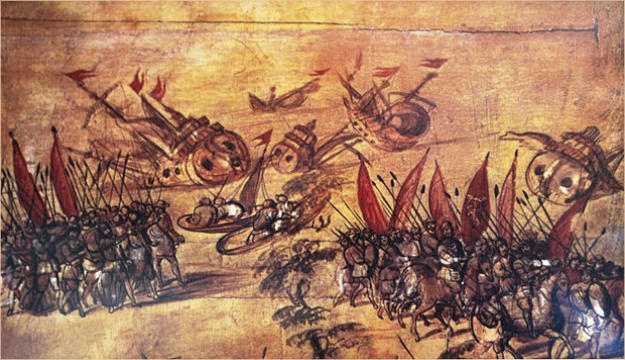“And
many
of
those
who
practiced
magic
brought
their
books
together
and
began
burning
them
in
the
sight
of
all;
and
they
counted
up
the
price
of
them
and
found
it
fifty
thousand
pieces
of
silver.
So
the
word
of
the
Lord was growing mightily and prevailing” (Acts 19:19,20).
“Burn the Ships”
Though
commissioned
to
lead
the
third
expedition
to
conquer
and
colonize
Mexico,
Hern
á
n
Cort
é
s
found
himself
beset
with
a
predicament.
Shortly
before
his
departure
in
February
1519,
the
governor
of
Cuba
withdrew
his
appointment.
Cort
és
’
response
to
this
was
simply
to
ignore
the
governor’s
orders
and
forge
ahead
on
his
mission
anyway.
With
him
was
a
force
of
11
ships
and
500
soldiers,
some
of
whom
were
not
entirely
loyal
to
their
mutinous
leader.
So,
upon
reaching
the
Mexican
coast,
he
consolidated
his
command,
first,
by
sending
a
disaffected
subordinate
on
another
mission
and
then
by
disciplining
his
men
into
an
effective
fighting
force.
Yet,
in
a
final,
extreme
expression
of
his
irrevocable
determination
to
achieve
his
goal
at
all
costs,
he
had
the
ships
burned
(Encyclopedia
Britannica).
From
then
on,
everyone
knew
that
there
would
be
no
turning
back.
The
only
choice
left
to
them
was
to
stand
still
and
die
or
move
forward
and
conquer.
So,
they
moved
forward
under
the
leadership
of
Cort
és
and,
against
overwhelming
odds,
within
a
few years had subdued the mighty Aztec Empire and conquered Mexico.
In
truth,
everyone
enters
this
world
under
“burn-the-ships”
circumstances.
Once
God
has
created
them,
they
cannot
turn
back
to
non-existence.
All
the
possibilities
they
have
are
those
which
lie
before
them.
The
only
decision
left
to
them
is
whether
they
will
live
or
die,
conquer
or
perish,
or
spend
eternity
in
heaven
or
hell.
They
are
left
no
alternative.
God
has
cast
them
upon
the
shores
of
life
without
any
means
of
returning
to
anything
else.
Their
creation
cannot
be
reversed
or
their
existence
undone.
Their
“ships”
have
been
burned.
They
must
either
move
forward and storm life’s gates all the way to heaven — or die in place and go to hell.
This
“burn-the-ships”
mentality
is
reflected
in
the
total
commitment
of
God’s
servants
to
conquer
the
world.
When
the
Israelites
fought
the
Canaanites
under
Joshua’s
leadership,
he
commanded
them
to
hamstring
the
horses
and
burn
the
chariots
(Josh.
11:6-9),
thus
rendering
them
useless.
Any
other
army
might
collect
the
weapons
of
their
enemies
and
turn
them
against
them,
but
not
the
Israelites.
Joshua’s
command
represented
an
utter
repudiation
of
reliance
on
any
sources
of
power
other
than
God.
Jesus
also
confronted
those
who
would
be
His
disciples
with
a
“burn-the-ships”
challenge.
He
told
them
that,
if
it
was
required
for
the
salvation
of
their
souls,
they
must
even
gouge
out
their
right
eyes
or
cut
off
their
right
hands
(Matt.
5:29,30).
Though
not
meant
literally,
it
did
dramatically
represent
the
necessity
of
ridding
from
their
lives
anything
as
precious
as
their
right
eyes
or
right
hands
if
that
is
what
it
took
to
save
their
souls.
In
other
words,
“burn
the
ships.”
There
can
be
no
turning
back
but
only
a
relentless
moving
forward,
wading
through
the
ranks
of
any
enemies
who
would
deter,
distract,
or
dissuade
from
total
conquest,
hacking
and
cleaving
along
the
way.
Jesus
said,
“No
one,
after
putting
his
hand
to
the
plow
and
looking
back,
is
fit
for
the
kingdom
of
God”
(Lk.
9:62).
The
disciples
in
Ephesus
appreciated
this.
Having
understood
that
their
books
of
magic
were
worse
than
worthless,
they
burned
them,
quite
literally, at the loss of 50,000 pieces of silver.
Yet,
only
those
who
are
woefully
short-sighted
would
see
this
as
a
real
loss,
for
everyone,
regardless
of
how
much
of
this
world
he
has
or
enjoys,
is
going
to
lose
everything
forever
in
death.
Everyone
leaves
this
world
as
naked
as
he
came
into
it
(Job
1:21;
1
Tim.
6:7).
The
sole
question
is
whether
they
will
move
forward
in
conquest
or
die
in
defeat.
It
is
only
through
a
“burn-the-ships”
determination
that
anyone
will
conquer,
but
with
it
he
cannot
fail
to
conquer.
“…
We
are
more
than
conquerors through Him that loved us” (Rom. 8:37, KJV).
Miguel Gonzalez - Hernán Cortes scuttling his fleet off the Veracruz coast
On display at the Naval History Museum in Mexico City
Photo by Alejandro Linares Garcia
Copyright © 2017 - current year, Gary P. and Leslie G. Eubanks. All Rights Reserved.

Copy of a
portrait of
Hernán Cortés
by the Mexican
painter, José
Salomé Pina.
On display at
the Prado
Museum,
Madrid.


Copy of a
portrait of
Hernán
Cortés by
the Mexican
painter,
José
Salomé
Pina. On
display at
the Prado
Museum,
Madrid.
“Burn the Ships”
Though
commissioned
to
lead
the
third
expedition
to
conquer
and
colonize
Mexico,
Hern
á
n
Cort
é
s
found
himself
beset
with
a
predicament.
Shortly
before
his
departure
in
February
1519,
the
governor
of
Cuba
withdrew
his
appointment.
Cort
és
’
response
to
this
was
simply
to
ignore
the
governor’s
orders
and
forge
ahead
on
his
mission
anyway.
With
him
was
a
force
of
11
ships
and
500
soldiers,
some
of
whom
were
not
entirely
loyal
to
their
mutinous
leader.
So,
upon
reaching
the
Mexican
coast,
he
consolidated
his
command,
first,
by
sending
a
disaffected
subordinate
on
another
mission
and
then
by
disciplining
his
men
into
an
effective
fighting
force.
Yet,
in
a
final,
extreme
expression
of
his
irrevocable
determination
to
achieve
his
goal
at
all
costs,
he
had
the
ships
burned
(Encyclopedia
Britannica).
From
then
on,
everyone
knew
that
there
would
be
no
turning
back.
The
only
choice
left
to
them
was
to
stand
still
and
die
or
move
forward
and
conquer.
So,
they
moved
forward
under
the
leadership
of
Cort
és
and,
against
overwhelming
odds,
within
a
few
years
had
subdued
the
mighty
Aztec
Empire
and
conquered Mexico.
In
truth,
everyone
enters
this
world
under
“burn-the-
ships”
circumstances.
Once
God
has
created
them,
they
cannot
turn
back
to
non-existence.
All
the
possibilities
they
have
are
those
which
lie
before
them.
The
only
decision
left
to
them
is
whether
they
will
live
or
die,
conquer
or
perish,
or
spend
eternity
in
heaven
or
hell.
They
are
left
no
alternative.
God
has
cast
them
upon
the
shores
of
life
without
any
means
of
returning
to
anything
else.
Their
creation
cannot
be
reversed
or
their
existence
undone.
Their
“ships”
have
been
burned.
They
must
either
move
forward
and
storm
life’s
gates
all
the
way
to
heaven
— or die in place and go to hell.
This
“burn-the-ships”
mentality
is
reflected
in
the
total
commitment
of
God’s
servants
to
conquer
the
world.
When
the
Israelites
fought
the
Canaanites
under
Joshua’s
leadership,
he
commanded
them
to
hamstring
the
horses
and
burn
the
chariots
(Josh.
11:6-9),
thus
rendering
them
useless.
Any
other
army
might
collect
the
weapons
of
their
enemies
and
turn
them
against
them,
but
not
the
Israelites.
Joshua’s
command
represented
an
utter
repudiation
of
reliance
on
any
sources
of
power
other
than
God.
Jesus
also
confronted
those
who
would
be
His
disciples
with
a
“burn-the-ships”
challenge.
He
told
them
that,
if
it
was
required
for
the
salvation
of
their
souls,
they
must
even
gouge
out
their
right
eyes
or
cut
off
their
right
hands
(Matt.
5:29,30).
Though
not
meant
literally,
it
did
dramatically
represent
the
necessity
of
ridding
from
their
lives
anything
as
precious
as
their
right
eyes
or
right
hands
if
that
is
what
it
took
to
save
their
souls.
In
other
words,
“burn
the
ships.”
There
can
be
no
turning
back
but
only
a
relentless
moving
forward,
wading
through
the
ranks
of
any
enemies
who
would
deter,
distract,
or
dissuade
from
total
conquest,
hacking
and
cleaving
along
the
way.
Jesus
said,
“No
one,
after
putting
his
hand
to
the
plow
and
looking
back,
is
fit
for
the
kingdom
of
God”
(Lk.
9:62).
The
disciples
in
Ephesus
appreciated
this.
Having
understood
that
their
books
of
magic
were
worse
than
worthless,
they
burned
them, quite literally, at the loss of 50,000 pieces of silver.
Yet,
only
those
who
are
woefully
short-sighted
would
see
this
as
a
real
loss,
for
everyone,
regardless
of
how
much
of
this
world
he
has
or
enjoys,
is
going
to
lose
everything
forever
in
death.
Everyone
leaves
this
world
as
naked
as
he
came
into
it
(Job
1:21;
1
Tim.
6:7).
The
sole
question
is
whether
they
will
move
forward
in
conquest
or
die
in
defeat.
It
is
only
through
a
“burn-the-ships”
determination
that
anyone
will
conquer,
but
with
it
he
cannot
fail
to
conquer.
“…
We
are
more
than
conquerors through Him that loved us” (Rom. 8:37, KJV).
Miguel Gonzalez - Hernán Cortés scuttling his fleet off the Veracruz coast
On display at the Naval History Museum in Mexico City
Photo by Alejandro Linares Garcia
Copyright © 2017 - current year, Gary P. and Leslie G. Eubanks. All Rights Reserved.
“And
many
of
those
who
practiced
magic
brought
their
books
together
and
began
burning
them
in
the
sight
of
all;
and
they
counted
up
the
price
of
them
and
found
it
fifty
thousand
pieces
of
silver.
So
the
word
of
the
Lord
was
growing
mightily
and
prevailing” (Acts 19:19,20).















